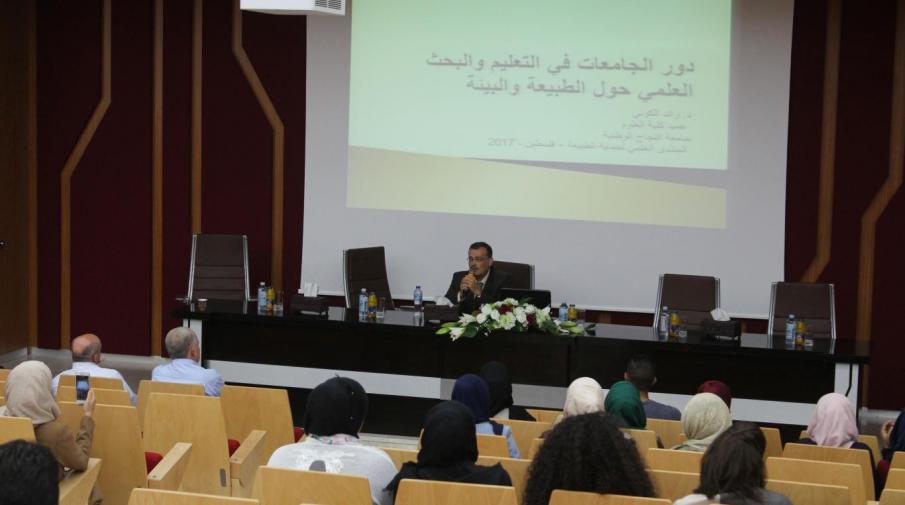Arab American University hosted the first scientific convention, organized by the university Faculty of Science and Scientific Forum for Nature Protection – Palestine, titled “Saving Environment and Biodiversity in Palestine” to search for nature preventing ways.
First Scientific Session Titled “Saving Environment and Biodiversity in Palestine”
Dean of Faculty of Science at Arab American University Dr. Moaiad Abu Sa’, academic staff of both Al-Quds and Arab American Universities, specialized workers and environments interested, Biology and biotechnology students, and representatives of agricultural ministry and environmental quality authority, all attended it.
After national anthem, Dr. Rola Jadallah from Arab American University gave the opening speech, welcoming attendees and introducing the scientific forum for protecting Palestinian nature. She said, intensive meetings were held between scientific competencies in Palestinian universities and governmental and private institutions on biodiversity to protect nature. It was agreed to establish the forum at the headquarters of Wildlife Society in Beit Sahour city with active participation from Environmental Quality Authority. Explaining, founding committee includes Al-Quds University as president and membership of the Arab American University, An-Najah University, Bethlehem University, Hebron, Palestine Technical and Wildlife Society as a headquarter. Noting, this field remains open to other Palestinian universities by appointing a delegate as coordinator to follow up the forum activities.
In the Scientific Forum for Protecting Nature speech by Dr. Khalid Sawalha, Forum President, called for interest of wildlife, biodiversity and natural resources in Palestinian universities through scientific research, field survey, documenting scientific and academic sources and work on rehabilitating cadres of students and graduates under Palestinian scientific supervision.
Deputy Director General of Environmental Resources in the Environment Quality Authority Mohammad Mahasneh gave explanation on the environment authority, its subsidiaries and projects to be implemented. Stressing it’s important to partnering with universities and civil institutions to implement projects.
As for Dr. Raed Al-Kony, Dean of the Faculty of Science at An-Najah University, presented a paper on the universities role in education and scientific research on nature and environment. He stressed on the need to organize researches on monitoring environmental situation in Palestine and formatting a research group for field studies and activate Environmental education.
Imad Al-Atrash from Wild Life Protection Association in Palestine presented the society and its role in community, which works in various fields such as concepts of nature protection, environmental survey of biodiversity, environmental tourism and human training in these fields.
Dr. Bashar Saad, lecturer at Arab American University Faculty of Science, mentioned the plants importance and how to deal with them.
Student Reema Salameh, student at Arab American University Biology and Biotechnology Department, stressed on importance of involving students and use their powers in collecting environmental data.
By the end of session, participants issued several recommendations, most notably forming academic research group for field and survey studies, and identification of hot sites to monitor biodiversity in line with national plan. They also stressed on the need to involve private sector in applications and potential investments, make joint projects to protect nature and provide governmental and institutional logistic support, activate ecotourism in Palestinian universities to increase the environmental awareness of education, develop existing programs in university for bachelor and master, and enrich existing natural museums with samples from surveys, field trips and establish others.

